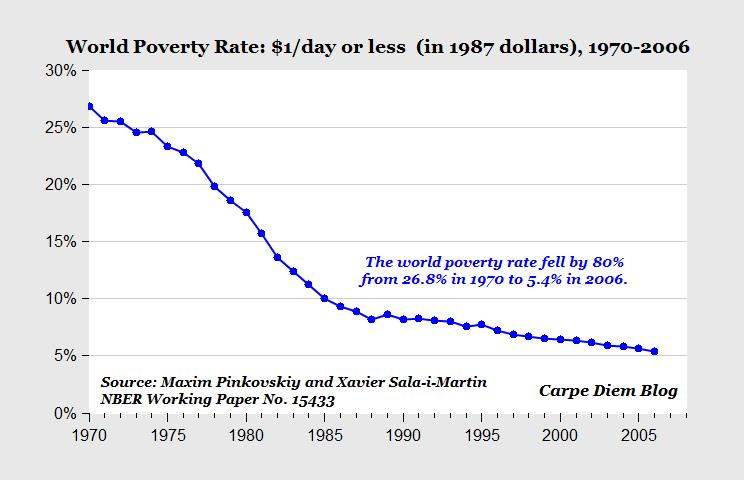
Dartmouth economics professor Douglas Irwin has an excellent op-ed in today’s Wall Street Journal — “The Ultimate Global Antipoverty Program,” with the subtitle “Extreme poverty fell to 15% in 2011, from 36% in 1990. Credit goes to the spread of capitalism.” Here’s an excerpt:
The World Bank reported on Oct. 9 that the share of the world population living in extreme poverty had fallen to 15% in 2011 from 36% in 1990. Earlier this year, the International Labor Office reported that the number of workers in the world earning less than $1.25 a day has fallen to 375 million 2013 from 811 million in 1991.
Such stunning news seems to have escaped public notice, but it means something extraordinary: The past 25 years have witnessed the greatest reduction in global poverty in the history of the world.
To what should this be attributed? Official organizations noting the trend have tended to waffle, but let’s be blunt: The credit goes to the spread of capitalism. Over the past few decades, developing countries have embraced economic-policy reforms that have cleared the way for private enterprise.
The reduction in world poverty has attracted little attention because it runs against the narrative pushed by those hostile to capitalism. The Michael Moores of the world portray capitalism as a degrading system in which the rich get richer and the poor get poorer. Yet thanks to growth in the developing world, world-wide income inequality—measured across countries and individual people—is falling, not rising, as Branco Milanovic of City University of New York and other researchers have shown.
Capitalism’s bad rap grew out of a false analogy that linked the term with “exploitation.” Marxists thought the old economic system in which landlords exploited peasants (feudalism) was being replaced by a new economic system in which capital owners exploited industrial workers (capitalism). But Adam Smith had earlier provided a more accurate description of the economy: a “commercial society.” The poorest parts of the world are precisely those that are cut off from the world of markets and commerce, often because of government policies.
MP: From a December 2013 CD post, “the chart above could perhaps qualify as the ‘chart of the century’ because it illustrates one of the most remarkable achievements in human history: the 80% reduction in world poverty in only 36 years, from 26.8% of the world’s population living on $1 or less (in 1987 dollars) in 1970 to only 5.4% in 2006. (Source: The 2009 NBER working paper “Parametric Estimations of the World Distribution of Income,” by economists Maxim Pinkovskiy (MIT) and Xavier Sala-i-Martin (Columbia University).
In that post, I also featured the video below, where AEI president Arthur Brooks also makes the case that free markets, free enterprise, and capitalism are responsible for the remarkable reduction in world poverty over the last 40 years:
It turns out that between 1970 and 2010 the worst poverty in the world – people who live on one dollar a day or less – that has decreased by 80 percent (see chart above). You never hear about that. It’s the greatest achievement in human history, and you never hear about it.
So what did that? What accounts for that? United Nations? US foreign aid? The International Monetary Fund? Central planning? No.
It was globalization, free trade, the boom in international entrepreneurship. In short, it was the free enterprise system, American style, which is our gift to the world.
I will state, assert and defend the statement that if you love the poor, if you are a good Samaritan, you must stand for the free enterprise system, and you must defend it, not just for ourselves but for people around the world. It is the best anti-poverty measure ever invented.











Sign up on lukeunfiltered.com or to check out our store on thebestpoliticalshirts.com.